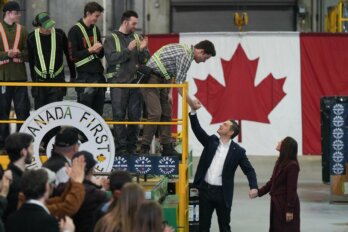In November of last year, I reached out to foreign affairs minister Mélanie Joly’s office with a question. The prime minister of Lebanon had, just days earlier, put forward a peace plan to halt Israel’s war in Gaza; to release the hostages held by Hamas; and to put the region back onto the path to peace. “Can you tell me,” I wrote to Joly’s staffer, “if Canada has been a part of those conversations, and what Ottawa’s position is vis-à-vis the plan?”
Prime minister Najib Mikati was practically begging any and all Western leaders to sign onto his plan. At that point, Israel was still cleaning up from Hamas’ horrific October assault, and their response was already well on its way to reducing Gaza City to rubble—by early November, 10,000 were already dead.
Two days went by and, despite a promise that Joly would clarify her stance, I heard nothing. The United States made its position known (“That’s not [the] policy we’re pursuing,” the state department said), Europe’s position on the war was its usual chaos, with its member states distracted by the war in Ukraine and internal political upheaval.
At the time, Mikati was seen as an interim leader in a country racked by political chaos. (Worth noting that he is still in the job.) But this was the first serious proposal with a regional leader. It both recognized the enormous risk that Israel’s war was not just another skirmish in a long line of military interventions in Gaza—but it was, instead, the start of the deadliest war the region had seen in decades. And, Mikati seemed to appreciate, this was an opportunity to avert disaster. Or, at least, try.
But Canada remained mum. Instead, more than a month later, Ottawa co-signed a declaration with Australia and New Zealand endorsing a “pause” in fighting and calling on everyone involved to “support urgent international efforts towards a sustainable ceasefire.” Canada voted in favor of a similarly-worded resolution at the United Nations later that day.
Since then, Ottawa’s position on the bloody conflict has lurched ahead in half-steps—sanctions against a few Israeli extremists and a flimsy arms embargo. One of the greatest humanitarian tragedies of the twenty-first century—certainly one of few committed by an ostensible ally—has continued as Ottawa has dithered.
Perhaps Canadian support would have done little to advance Mikati’s peace formula. But what we can say for certain, though, is that a vaguely-written statement from Canada and the two Oceanic powers was never going to achieve much either. The country’s refusal, or inability, to do anything more is both an indictment of its indecision on this conflict and a sign of how rudderless its foreign policy has become.
“Canada’s strong tradition of peacekeeping owes much to Lester B. Pearson, who championed the first armed United Nations peacekeeping mission during the Suez Crisis in 1956,” prime minister Justin Trudeau declared in a statement in 2017. In the missive, issued to mark the annual Peacekeepers’ Day, the prime minister vowed “we will continue to work with the UN and other organizations to create a safer, more secure world for all.”
Instead, Canada’s peacekeeping commitments sunk to new lows. As of writing, we have just thirty-one peacekeepers stationed abroad, placing us seventy-second in the UN rankings. Our most significant contribution in recent memory, a year-long peacekeeping mission in Mali, initiated in June 2018, was more symbolism than practically helpful. Ottawa rebuffed requests to send a meaningful contingent of peacekeepers and instead deployed a 250-person team to provide medical evacuation support.
Despite the mission’s technical success, critics suggested it was more about enhancing Canada’s international image and securing a UN Security Council seat than addressing Mali’s complex security challenges. (Unsurprisingly, we failed at securing that seat.) The government in Bamako, instead, turned to the Russian Wagner Group to try and restore peace and stability. The Russian mercenaries have been accused of profiteering and war crimes, but their willingness to fight and die has endeared Russia to those living in the Sahel, who feel, rightly, abandoned by the Western world.
One of the key reasons why Canadian peacekeeping has been allowed to die is because it, like our foreign policy more broadly, has become beholden to myth. We have come to imagine the Canadian peacekeeper as some kind of magical force, capable of instilling calm with their mere presence. Canada, for example, did not stumble into leading a peacekeeping mission during the Suez Crisis. Instead, Pearson actively involved himself in the diplomatic efforts to avoid armed conflict between Israel, France, and the United Kingdom, on one side, and Egypt, on the other. When war seemed inevitable, the prime minister worked with Washington to put together the plan for a multi-nation peacekeeping force to head to the Sinai Peninsula and avert the crisis. Canada’s creation of a UN peacekeeping force helped bring the conflict to a relatively equitable end.
Canada did not descend from the heavens to stop the fighting, but rather Pearson pursued an aggressive diplomatic posture and put forward concrete solutions, without waiting for other countries to invite us to do so. Put simply: we became a peacekeeping nation because we were willing to stand up to our allies, commit real resources, play realpolitik, and take actual risks to secure peace.
In the decades since, we have abandoned the idea that Canada could be a peacemaker, and we have instead come to think of peacekeeping as a kind of referee role. But as the limits of Roméo Dallaire’s mission in Rwanda show, becoming an “honest broker” between two sides can mean tolerating genocide.
The declining importance of increasingly-riven international bodies like the UN in pursuing and maintaining peace, and our distorted idea of what peacekeeping can do, is part of the reason why Canada attempted to pivot into becoming a “warrior nation” during the War on Terror. But we learned, as the US has, that expeditionary foreign wars rarely create more peace. Continued chaos in North Korea, Vietnam, Iraq, and Afghanistan stands testament to this lesson.
Today, Trudeau has recommitted to this peacekeeping myth. However, he has done so at a time when Canada’s military prowess has been weakened and underfunded. Our equipment is aging. An internal report accessed by the CBC indicates that almost half of the Canadian Armed Forces’ equipment is “unavailable and unserviceable.” To make matters worse, our diplomatic corps have fallen into total disrepair. Last year, the National Post spoke to former and current employees and diplomats from Global Affairs Canada, our foreign service, and found an agency that was “risk-averse, complacent and Ottawa-centric.” Officials want peacekeeping missions and diplomatic engagements that are easy and safe, even when pursuing real peace is rarely either of those things. We have not only shirked our responsibility in Mali, but also in Haiti, where we bear some blame for the political calamity the island nation is facing.
At the dawn of the war in Gaza, human rights groups hoped that the crisis would instill Ottawa with new purpose and mission. That hope was misplaced. Yes, Ottawa slowly came around to supporting a ceasefire, and it joined its allies in sanctioning some settler groups in Israel responsible for attacks on civilians in the West Bank. Starting in early 2024, Ottawa also suspended some, but not all, arms sales to Israel.
But Canada’s positions, almost uniformly, have come as co-signed statements with other nations. There has been precious little evidence that Canada has, at any point, tried to actually build a diplomatic consensus for a ceasefire, apply serious pressure to Israel to halt hostilities, to manage more aid delivery to Gaza, or really to do much of anything at all.
At the same time, Ottawa has been happy to trumpet the conferences it has held, the outreach it has conducted, and the constant diplomatic engagement it has pursued to help Ukraine defend itself from Russian aggression. But this work is, comparatively, easy. There was no question whether Ottawa ought to back Kyiv, and there was no equivocation on what ought to be done—sanction Moscow and ship weapons to Ukraine. Canada has managed to do those things, albeit imperfectly; our sanctions continue to be porous and our weapon shipments continue to be insufficient. Even if Ukraine illustrates our declining ability to project power, at least the Trudeau government has been able to pick a position and advance it.
What is Canada actually doing to promote peace in Gaza?
“My constituents are sick and tired of empty words,” Salma Zahid told The Walrus last month. “They want to see some bold actions.”
Zahid, who represents Scarborough Centre, is a Liberal member of parliament and chair of the Canada-Palestine Parliamentary Friendship Group, a group of MPs and senators who meet to discuss issues facing Palestine. For months, Zahid has been openly critical of her government’s approach to the conflict. When I spoke to Zahid, Israel was escalating its bombing campaign in Lebanon. She recounted how many of her constituents still have family back home, who spend their evenings glued to their phones, waiting for WhatsApp updates from their loved ones.
In October, Zahid and the group released a list of requests to the Canadian government. It included supporting a resolution at the UN calling for peacekeepers in Gaza; implementing a total arms embargo on Israel; and, perhaps most importantly, recognizing the Palestinian state. That final point, that Ottawa ought to become the first G7 nation to recognize the sovereignty of the state of Palestine, is gaining favor.
“Recognizing a Palestinian state now is about sending a message of hope and commitment to Palestinians,” Jon Allen told the House of Commons foreign affairs and international development committee in October. “And sending a clear message to Israel and others that simply managing the conflict, Israel’s policy for the last 17 years, is not an option and never was.” What’s more, Allen said, “our governments have done little to nothing to prevent settlement expansion or advance the goal of two states.”
Other nations have tried to apply pressure. In 2022, a UN committee moved a resolution asking the International Court of Justice to investigate Israel’s continued settlement expansion. Canada voted against it. It passed anyway, and this July, the court rendered its verdict, finding Israeli presence in the West Bank unlawful and contrary to the Geneva Conventions. Another vote at the UN, calling for Israel to bring an “end without delay its unlawful presence” in Palestine, passed—yet Canada abstained.
Canada could be actively pushing these critical conversations in a responsible way that doesn’t seek to demonize and destroy Israel. That would begin at the ambassador level and continue up through our foreign minister, to her foreign counterparts, and our prime minister. Instead, it can’t even bring itself to vote for the very position that it claims to hold: that Israel is violating international law.
Allen, who is now a senior fellow at the Munk School of Global Affairs and Public Policy at the University of Toronto, is Stephen Harper’s former ambassador to Israel. He is also Jewish, and has family living on the border of Lebanon—facing the daily threat of bombardment from Hezbollah. It’s that perspective that allows him to make a claim that is too often ignored in the West: “The greatest threat to Israel is from within and it will never be secure as long as it continues to occupy the Palestinian people in the West Bank and Gaza.”
As Allen told the committee, Ottawa’s position has long been that Israel’s settlement-building is illegal and a barrier to peace, and that the creation of an independent Palestinian state is the only viable avenue toward peace. Yet, now, when it is truly called upon to put those principles into action—to put real weight behind them when they matter most—Ottawa has shrunk into a corner, with the prime minister insisting, in high-minded statements, that “we remain committed to working toward an irreversible path to achieving a two-state solution, where Israelis and Palestinians can live side by side within internationally recognized borders.”
But there is a painful naivete to that position, as Zahid explains. “What Netanyahu is signaling is, very clearly, not a two-state solution.” Indeed, Netanyahu has long vowed to oppose any sort of two-state solution. His coalition mates, which occupy several critical cabinet spots, are openly touting annexation of Gaza and most, if not all, of the West Bank. Not only is the current Netanyahu government an opponent of peace, it seems to be pursuing policies, including a “buffer zone,” that will see Israel spend decades trying to conquer land once inhabited by more than two million people.
When the NDP, earlier this year, introduced a non-binding motion, calling on Ottawa to recognize the state of Palestine, the Liberal party raced to save face without having to take a stand. The Liberals amended the motion, removing the call to actually recognize Palestine as a sovereign state.
“146 of 193 UN member states already recognize a Palestinian state,” Allen pointed out to the parliamentary committee last month, “including 14 EU members.”
Canada, if it took this step, would be the first G7 country to do so. That’s precisely why it should. For years, the West has avoided making such a declaration, fearful of making any sudden movements which could frustrate hopes for negotiations between Israel and the Palestinian Authority. But now, Israel is on the cusp of entirely delegitimizing the PA, the legitimate government authority for all the Palestinian territories, by planning to isolate them from post-war Gaza. Canada ought to stand up and recognize the critical role the PA must play in future negotiations.
Canada, alongside some of its allies, continues to be paralyzed by indecision. If it doesn’t act soon, there may be nobody for Israel to even negotiate with. Israel may simply appoint a compliant government in Gaza, over whom it will exert authority and veto power. Plans for permanent military bases, perhaps even residential settlements, in the Gaza Strip should alarm the world. “Clearly, the train is leaving the station,” Allen continued. “In my view, Canada and its closest allies, all of whom support two states—even more now, post-October 7, than before—should all get onboard that train.”
Ottawa being the first nation to echo such a call would be significant. But it wouldn’t be enough, either. Canada needs to get back in the business of building peace, as Pearson once did. Chit-chatting with other liberal-minded nations, issuing statements, and delivering high-minded rhetoric is not a real foreign policy.
I reached out to Joly’s office again in October to discuss Canada’s approach. Despite, again, promises that the minister would be keen to talk about Ottawa’s work on the crisis, I never heard back.




